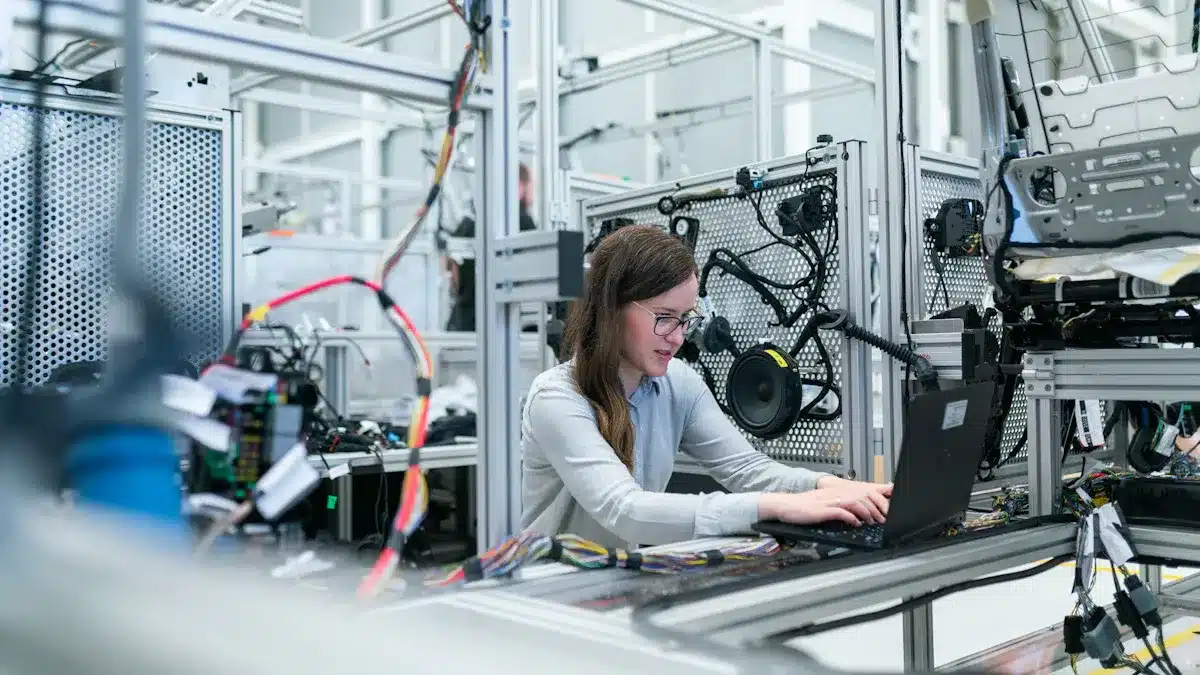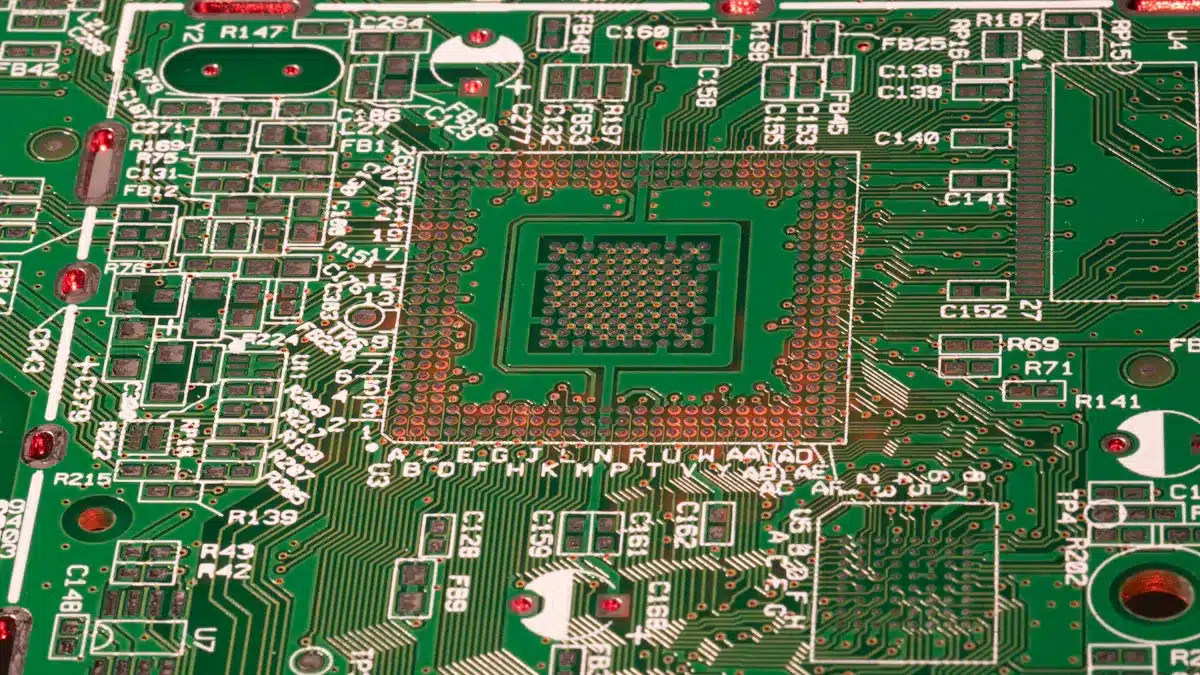
Choosing the right PCB manufacturer in the USA is very important for your project. Quality is a big part of this, especially when it comes to PCB manufacturing USA standards. Studies show that 20% of electronic products fail because of bad PCB quality. This highlights how crucial good quality control is in PCB manufacturing USA processes. Additionally, costs can vary significantly depending on what the manufacturer can offer. Special manufacturing methods might cost more initially, but they can improve the product’s performance and longevity. Therefore, you need to carefully consider these factors to ensure your final product meets your expectations.
Key Takeaways
Pick a PCB maker with good quality certifications like ISO 9001. This helps lower mistakes and gives you reliable products.
Think about all costs like labor, materials, and shipping. U.S. makers usually provide better quality and quicker service.
Find makers that can create the type of PCB you need. This includes multilayer or flexible boards to prevent design issues.
Quick turnaround options are there for urgent projects, but they might cost more. Good communication with your maker helps keep projects on schedule.
Ask about their experience, certifications, quality checks, and support. This helps you find a trustworthy maker that meets your project needs.
Key Considerations in PCB Manufacturing USA

When you choose a PCB manufacturer, think about some important factors. These factors can really affect how well your project does. Knowing these things will help you make a smart choice.
Quality Assurance
Quality assurance is very important in PCB manufacturing. It makes sure that the printed circuit boards are good and work well. Manufacturers often get certifications to show they care about quality. Here are some certifications to look for:
Certification | Industry/Application | Key Requirements/Focus |
|---|---|---|
ISO 9001 | General Quality Management | Documented procedures, employee training, regular audits, corrective actions |
ISO 13485 | Medical Devices | Includes ISO 9001 QMS plus risk management, design controls, FDA regulatory compliance |
AS9100 | Aerospace | ISO 9001 QMS plus gap analysis, documented procedures, employee training, FAA regulatory compliance |
Product Safety | Visual, electrical, thermal, mechanical testing; different UL standards for various PCB types | |
IPC Certification | Electronics Industry | Quality and reliability standards with 3 classes (consumer, industrial/medical, aerospace/military); standards like IPC-A-600, IPC-J-STD-001, IPC-TM-650 |
ITAR | Military/Defense | Compliance with US export control laws, high quality and reliability standards |
MIL Standards | Military/Defense | Specific military specs like MIL-PRF-31032 (rigid boards), MIL-PRF-55110 (laminates); mandatory for military suppliers |
Choosing a manufacturer with these certifications can help reduce defects. For example, ISO 9001-certified manufacturers have up to 20% fewer defects than those without. This is because they follow strict processes and quality checks.
Cost Evaluation
Cost is another important part of PCB manufacturing. You should look at the total production cost, which includes labor, materials, tooling, and shipping. Here’s a cost comparison between U.S. manufacturers and those overseas:
Cost Factor | USA Cost Range / Characteristics | Overseas (China) Cost Range / Characteristics |
|---|---|---|
Labor Costs | $20 to over $30 per hour | $3 to $7 per hour |
Material Costs | Higher due to imports and less integrated supply | Lower due to integrated supply chain and proximity to sources |
Tooling & Setup | Higher, especially for prototypes and low volume | Lower, often absorbed to attract volume orders |
Tariffs & Shipping | N/A | Up to 25% tariffs plus shipping costs |
Production Scale | Focus on low-to-mid volume, higher per-unit cost | Large scale, economies of scale reduce unit cost |
While U.S. manufacturers may cost more upfront, they usually offer better quality and faster service. Also, ordering in larger amounts can give you discounts, making it cheaper for bigger production runs.
Turnaround Time
Turnaround time is very important, especially if you have tight deadlines. Standard PCB fabrication lead times in the U.S. usually take 2 to 8 weeks. This depends on how complex the board is and how busy the manufacturer is. Quick-turn services can get PCBs to you in as little as 24 hours to a few days, mainly for prototypes or small orders.
Here are some typical turnaround times:
Standard PCB fabrication lead times range from 2 to 8 weeks.
Quick-turn services can deliver PCBs in as little as 24 hours to a few days.
Standard turnaround times show regular production schedules, while quick-turn options are for urgent needs.
Fast turnaround can help you finish projects quicker. This is very important in competitive electronics where getting to market fast matters.
Capabilities and Types of PCBs
Knowing what a PCB manufacturer can do is very important. Different types of printed circuit boards are used for different purposes. U.S. manufacturers mainly make:
PCB Type | Market Share / Growth | Key Applications and Notes |
|---|---|---|
Multilayer PCBs | Largest segment; widely used in consumer electronics, automotive, telecommunications; supports complex circuitry | |
Rigid PCBs | Most commonly used laminate type | Used broadly in simpler electronic devices; cost-effective and reliable |
Rigid-flex PCBs | Fastest growing segment; ~10% CAGR (2023-2028) | Combines durability and flexibility; used in aerospace, medical devices, consumer electronics; supports miniaturization and lightweight designs |
Other types | N/A | Includes rigid 1-2 sided, HDI/Micro-via/Build-up, flexible PCBs; serve specialized applications |
Advanced capabilities, like High-Density Interconnect (HDI) and flexible circuits, need special skills and tools. Manufacturers that can make these types must have advanced technology and quality checks. This complexity affects your choice, so you should focus on manufacturers skilled in these advanced PCB designs.
How to Choose a PCB Manufacturer

Choosing the right PCB manufacturer means checking their experience and skills. You want to make sure they know how to make the type of printed circuit board you need. Here are some important questions to ask possible manufacturers:
How long have you been in business, and what types of PCBs do you make?
Do you have your own manufacturing facility? This helps control quality and production better.
How many employees do you have? Enough staff helps with good practices and on-time production.
What kind of training do your employees have? Skilled workers help ensure quality and good communication.
What technologies and processes do you use? This includes how you handle design needs and find errors.
What certifications do you have? Important ones include ISO 9001 and IPC standards.
How do you check for quality? Ask about inspection methods like automated optical inspections.
These questions help you understand the manufacturer’s skills and trustworthiness. A manufacturer with lots of experience and skilled workers can really help your project succeed.
Support and communication are also very important when picking a PCB manufacturer. Good customer support can check your designs early. This catches mistakes before they cause expensive fixes. Support teams often do Design for Manufacturability (DFM) checks. These checks can lower prototype failure rates by up to 20%. Here are some communication tips that clients like:
Use email for file sharing and video calls for quick help.
Set regular meetings to talk about progress and plan next steps.
Respond quickly to questions to avoid delays.
Share documents clearly and on time to cut down on mistakes.
Good communication helps prevent confusion and speeds up project work. When you choose a manufacturer that cares about customer service, you can feel more confident in the results. This leads to shorter lead times and better-quality PCB production.
Finding the Best PCB Manufacturer
Quick-Turn PCB Manufacturer Options
If you need PCBs fast, look at quick-turn PCB manufacturers. These companies are good at making PCBs quickly. They can often deliver in 24 hours to a few days. Here are some top quick-turn PCB manufacturers in the USA:
Bay Area Circuits (BAC): They have over 40 years of experience. BAC provides fast PCB making and assembly. They work with industries like aerospace and medical. They have ISO 9001 and ITAR certifications.
Advanced Circuits: Based in California, they offer quick-turn services. Their delivery times are from 24 hours to a few days.
PCB Unlimited: This company focuses on fast PCB assembly, especially for prototypes. They have a 24-hour service option.
Sunstone Circuits: They are known for their quick-turn abilities. They deliver PCBs fast, helping you meet tight deadlines.
Quick-turn PCBs usually cost more. You might pay 20-50% extra for fast services compared to regular times. But speed is important for projects with tight schedules.
Testing and Quality Assurance Procedures
Quality assurance is very important in PCB manufacturing. The best U.S. manufacturers use strict testing methods to ensure reliability. Here are some common methods they use:
Automated Optical Inspection (AOI): This technology finds visual problems, like misaligned parts.
In-Circuit Testing (ICT): This tests each part for shorts and opens to make sure they work right.
Functional Testing: This checks the PCB’s performance by powering it up under real conditions.
X-Ray Inspection: This advanced method looks inside the PCB to find hidden issues.
By choosing a U.S. manufacturer, you get strict quality standards. They follow rules like IPC and RoHS, making sure your PCBs are safe and reliable. Plus, local manufacturers can ship faster and communicate easier, which helps avoid misunderstandings.
Choosing the best PCB manufacturer means looking at their quick-turn options and quality checks. This careful choice ensures you get reliable products that fit your project needs.
Choosing the right PCB manufacturer is very important for your project. Picking the right one can help your product work better and be more reliable. Here are some important things to think about:
Evaluate Quality: Make sure the manufacturer follows industry standards like ISO 9001. This helps keep quality the same.
Assess Capabilities: Check if the manufacturer can meet your specific PCB needs. This stops design problems and delays.
Consider Long-Term Relationships: Working with a trustworthy manufacturer can improve product quality and lower risks.
Take your time to look at your choices. The right choice now can help you grow and succeed later. 🌟
FAQ
What is a PCB?
A PCB, or printed circuit board, is a board that connects electronic parts. It gives electrical paths and support for devices like smartphones, computers, and appliances.
How do I choose the right PCB type?
Think about what your project needs. Consider size, complexity, and use. Common types are multilayer, rigid, and flexible PCBs. Each type has different uses.
What are the benefits of U.S.-based PCB manufacturers?
Manufacturers in the U.S. usually offer better quality control, faster service, and easier communication. They also follow strict industry rules, which means their products are reliable.
How can I reduce PCB manufacturing costs?
You can save money by ordering in larger amounts, making designs simpler, and using standard materials. Getting quotes from different manufacturers can also help you find the best price.
What should I ask during the manufacturer selection process?
Ask about their experience, certifications, quality checks, and turnaround times. Also, ask how they handle design changes and communication to make sure everything goes smoothly.
See Also
Choosing The Ideal PCBA Manufacturer To Meet Business Goals
Finding The Top PCB Prototype Manufacturer For Your Project
Selecting The Right PCB Fabrication Manufacturer For Your Needs
Recognizing The Best PCBA Manufacturer To Ensure Business Success
Picking The Best PCBA Factory To Fulfill Custom Requirements